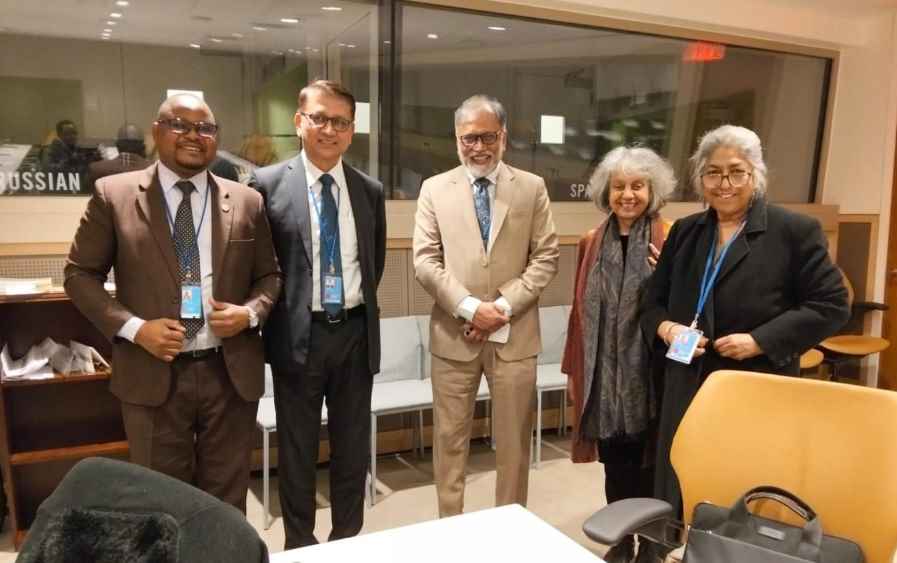
The 58th Session of the Commission on Population and Development (CPD58) is being held from 07 to 11 April 2025 at the United Nations Headquarters in New York, under the overarching theme: “Ensuring Healthy Lives and Promoting Well-being for All at All Ages.” In alignment with this year’s theme, Partners in Population and Development (PPD), in collaboration with the National Council for Population and Development (NCPD), Kenya, successfully co-organized a high-level side event on 8 April 2025 titled, “Integrating Population, Health and Environment (PHE): A Catalyst for Ensuring Healthy Lives and Well-being for All.” The event was also supported by UNDESA, the Centre for the Study of Adolescents (CSA) Kenya, and the African Institute for Development Policy (AFIDEP).
The PHE approach is rooted in the principles of the 1994 International Conference on Population and Development (ICPD) Programme of Action (PoA) which emphasizes the need to address the complex interplay between population, health, and sustainable development to improve quality of life for all. It advocates for universal access to sexual and reproductive health services, gender equality, and the sustainable management of natural resources to advance human well-being.
This side event was organized to showcase Country level PHE integration best practices and identify actionable strategies to promote this approach. It aimed to explore how best PHE programmes can contribute to ICPD agenda and strengthen global efforts to ensure healthy lives and well-being for all while conserving the environment to avert the effects of climate change.
The event brought together ministers, policymakers, technical experts, and development partners to explore integrated approaches that bridge the intersections of population dynamics, health systems, and environmental sustainability.
The side event featured a dynamic panel discussion of high-level leaders and technical experts representing The Gambia, Kenya, Bangladesh, Malawi, Mexico, UNDESA, and other partners. The event officially opened by Dr. Mohamed Sheikh, Director General of NCPD Kenya and the honorable Executive Committee Member of the PPD Board.
The session highlighted inspiring country-level experiences from The Gambia, Bangladesh, Malawi, and Kenya, illustrating how integrated approaches to population, health, and environment (PHE) can drive progress toward inclusive and sustainable development. The panelists included Dr. Ahmadou Lamin Samateh, Minister of Health of The Gambia; Mr. Shelton Kanyanda, Principal Secretary and Commissioner of Statistics for Malawi; Mr. John Wilmoth, Director of the Population Division at UN DESA; Dr. Md. Sarwar Bari, Secretary of the Medical Education and Family Welfare Division, Ministry of Health and Family Welfare, Bangladesh; Dr. Humphres Evelia, Executive Director of the Centre for the Study of Adolescents (CSA), Kenya; and Mr. Ken Lwaki, Assistant Director of Population at NCPD Kenya and National Focal Point for PHE and ICPD Follow-up.
In addition to the panelists, the event was attended by several notable dignitaries, including Dr. Habibatu Drammeh, Minister of Basic and Secondary Education of The Gambia; Professor Dr. Md. Sayedur Rahman, Honarable Special Assistant, Ministry of Health and Family Welfare, Bangladesh and Ambassador Yabesh, whose presence underscored the high-level political commitment to advancing the PHE agenda.
The side event has generated several impactful outcomes that have reaffirmed the value of integrated approaches in advancing global development priorities. Furthermore, the successful integration of PHE best practices from countries such as The Gambia, Bangladesh, Malawi, and Kenya has provided valuable insights to support Kenya’s ongoing efforts to establish a Centre of Excellence on Population and Development (CoE). This proposed CoE has aimed to serve as a regional hub for promoting knowledge exchange, innovation, and context-specific solutions to sustainable development challenges, grounded in the principles of South-South Cooperation. The initiative has contributed to building regional capacities and fostering partnerships that are responsive to diverse socio-economic and ecological realities.
This high-level engagement reaffirmed PPD’s continued commitment to supporting its member states and global partners in advancing inclusive, evidence-based, and people-centered policies that drive health, well-being, and sustainable development for all.
Delegates from Bangladesh, Kenya and the Gambia have come together with one umbrella commitment to address PPD’s current challenges urgently and ensure the sustainability of PPD for the vested interest of the people’s of the PPD countries.



